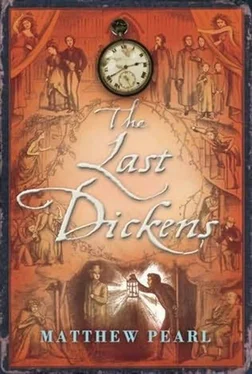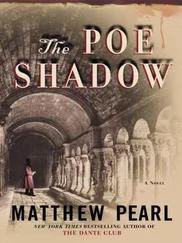Dolby, glowing with pride, continued with his soliloquy to the reporter, but Tom, no longer listening, was searching the rows for any clue to the location and intentions of the incubus. By the time Dolby had released his grip on Tom's arm, the lights flickered and then went out, except for a dramatic silver splash on the platform, where Dickens emerged in front of the plain screen amid a deafening welcome of cheers and several rounds of applause.
“Ladies and gentleman,” Dickens said, “I am to have the pleasure of reading to you first, tonight, A Christmas Carol in four staves. Stave One: Marley's Ghost. Marley was dead to begin with. There is no doubt whatever about that. The register of his burial was signed by the clergyman, the clerk, the undertaker, and the chief mourner. Scrooge signed it. And Scrooge's name was good upon exchange for anything he chose to put his hand to! Old Marley was as dead as a doornail.”
Tom felt his survey was hopeless in the dark galleries. His only chance was to wait until the lights were on again at intermission. If she were here to make some kind of trouble like she had done with the widow at the hotel, Tom would be on his toes. He would be ready. And if she tried to escape, Tom would call out to the policemen positioned at the doors to stop her. There was no way she could get out.
Tom's darting eyes caught a quick motion in one of the aisle seats. It was another blasted shorthand writer, a rapid-fire pencil blazing away in the hands of rakish Esquire, the Bookaneer. With no time for niceties, Tom reached in, grabbed the pencil, and cracked it in half. Esquire protested at the unlawful seizure of his property. Tom obliged, dropping the two halves into the man's hat on the floor. Another of the piratical species sitting across the way, the former substitute soldier Molasses, paused his own shorthand writing, putting his pencil between his jagged teeth to applaud his rival's misfortune. On his way past, Tom slapped Molasses on the back. The pencil broke between the Bookaneer's teeth and landed in his lap.
Dickens, meanwhile, continued.
The scene: Christmas eve. Dickens acting the part of Scrooge, turned in pantomime to his poor clerk, snarling, “ You'll want all Christmas day tomorrow, I suppose? ” Then all at once he was the simple clerk, a shining timid smile, saying, “ If quite convenient, sir. It's only once a year, sir. ”
“Branagan!”
“ A poor excuse for picking a man's pocket every twenty-fifth of December! ”
“Branagan!”
Tom heard the familiar urgent whisper and located Dolby at the front of the theater. He looked white, as white as one of the ghosts in the Chief's story. The manager mouthed some words that Tom could not follow and gestured. Tom moved closer to the foot of the stage and his jaw dropped.
Dickens was lighted twelve feet above the platform by a large iron batten with gaslights suspended by strong galvanized wire. This cast a dramatic shadow on the dark crimson screen that stood behind the reader. The replacement gasman had mistakenly arranged the copper wires directly over the gas jets, causing the wires to become red hot. If the gas were to burn through, the iron batten would fall and could not only land on Dickens but tumble down into the audience.
If the emergency were announced, the crowd would panic and rush away all at once, not only raising the risks of knocking against equipment that could induce the wires to snap but also trampling women and children along the way. Even if the iron batten tumbled down and somehow missed the audience members in the front stall of the theater, a fire could start and swallow up the whole place in a matter of minutes. There was no question about it: Dickens had to keep reading as though nothing were wrong.
Tom looked back at Dolby and nodded his understanding. With the new gasman in his hobbled condition, there was no hope of him helping. Tom went to the far wing of the stage and found the extra wire. As he readied this, there was a commotion at the stairs that led to one of the balconied galleries. Tom, looking at the iron batten and then back at the stairs, sprinted toward the disturbance. Could it be her about to charge at Dickens with her knife? But it was a man who came down, shaking both of his fists.
The man grabbed Tom's coat sleeve as though desperate for assistance. “Who the deuce is that man on the platform reading?”
“Charles Dickens,” Tom replied.
“But that ain't the real Charles Dickens, the man whose books I've been reading all these years?”
“Yes!”
“Well, all I've got to say about it then is, that he knows no more about Mister Scrooge than a cow does of pleatin’ a shirt, not my ideas of Scrooge, anyhow.”
“ I know him! Marley's ghost! ” Dickens bit his fingernails just as Scrooge did in the story. He rubbed his eyes and stared at the apparition. The muscles in his face tightened, his face seeming to contort into that of an old man.
Tom raced to the far wing, climbing up the back stairs until reaching the cupola above the ceiling of the hall. Around him were glass panels on the walls giving views of the entire city and all the way to the harbor islands. Rows of square ventilators lined the cupola to continually expel the heat and air from below. Tom lay on the floor and lowered his head and arms through a network of gas piping that separated the cupola from the hall. He could see Dolby standing all the way down below, urging on Tom's mission.
“ Mercy! Dreadful apparition, why do you trouble me? ” Scrooge was demanding.
A young woman with bright red hair and a bright red dress in the front row, her gaze roaming to the iron gas fixture, audibly gasped. Dickens, pausing, looked over to her and gestured for her with a slight movement of his hand to remain calm. So the Chief had seen! He, too, knew they must prevent a panic; and this pretty girl who probably went through great pains for months to claim a seat right at the foot of her favorite author in the world, suddenly had to trust this same author with her life.
From a seat in the middle, another woman shrieked. Tom shuddered at the helplessness of his position and the realization that they were about to witness a mass panic-but then saw it was a young woman in mourning crepe, who was grieved hearing about Tiny Tim. An usher escorted the sobbing young mother from her seat gently.
Tom, meanwhile, stretched his arm down over the batten to turn the gas flame lower. Next, looking down to signal Dolby to be in position in case anything dropped, Tom supported the batten with one hand while he meticulously wound the wire roll around another part of the iron structure and began fastening the other end to a hook in the ceiling left there from some earlier performance. Rounds of laughter came in waves from the audience. Dickens took a sip of water from the glass at the side of his reading desk. As Tom attached the wire, his head and arms just barely sticking out from the ceiling in view of the audience-they might have noticed him, had they not been enraptured by Dickens-he looked out into the crowd and immediately saw.
In the back of the second gallery of seats. The incubus he sought! She was rummaging inside her carpetbag. Was she looking at Tom? Had she seen him looking at her from high above?
Tom's heart raced.
“Go on! Finish!” Dolby called up in a throaty whisper of despair. “Hurry, Branagan! Hurry!”
Tom wanted to be done more than Dolby could have known. Tom had nearly finished his work above when he realized: Dickens was at the end of his Christmas Carol reading. That meant intermission. The doors would open: and the incubus, who possibly had already seen him spot her, would be free to escape.
“ And to Tiny Tim, who did not die… ” (a roll of cheers like thunder) “ And so, as Tiny Tim observed, God bless us, every one! ”
Читать дальше












